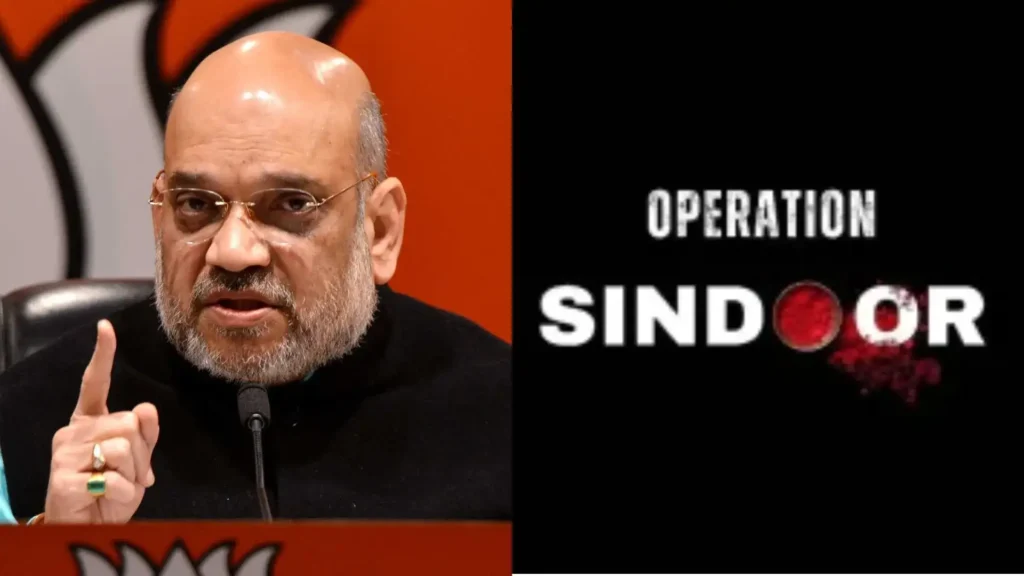Operation Sindoor: Amit Shah Calls Emergency Meet Amid Growing India-Pakistan Tension
New Delhi, May 9 — India’s Home Minister Amit Shah will chair an emergency meeting at 12:30 PM today as tension escalates along the India-Pakistan border. He will meet the chiefs of the Border Security Force (BSF) and the Central Industrial Security Force (CISF) to discuss security after Pakistan launched an unprovoked attack on Indian military posts.

On Thursday, Pakistani troops opened fire and targeted Indian army installations near the Line of Control (LoC), violating ceasefire agreements. In response, the Indian Army launched Operation Sindoor, a calculated counterstrike aimed at defending the nation’s border and pushing back against enemy aggression.
Indian Army Hits Back Swiftly
The Indian Army responded within minutes of the initial attack. Troops fired back with precision, using artillery and infantry support to silence enemy posts. Although one forward base suffered some damage, military officials confirmed there were no injuries among Indian personnel.
This swift action demonstrated India’s readiness to tackle any provocation. Officials stated that the operation’s goal includes halting infiltration, destroying enemy positions, and ensuring stability across the affected border sectors.
Shah to Lead High-Level Security Review
At 12:30 PM, Amit Shah will meet with top security officers to assess the ground situation. The meeting will focus on four main objectives:
- Reviewing troop readiness and surveillance capacity.
- Coordinating intelligence sharing among agencies.
- Ensuring safety for civilians living in border regions.
- Planning further response strategies if tensions continue.
Sources in the Ministry of Home Affairs said Shah has remained in constant touch with the National Security Advisor (NSA) and senior military commanders. His involvement reflects the seriousness of the situation and the government’s commitment to swift action.
Government Sends Clear Message
Prime Minister Narendra Modi received detailed briefings on the situation and is monitoring developments closely. In a late-night statement, the Prime Minister’s Office assured the nation that India will not tolerate threats to its sovereignty.
Meanwhile, Defence Minister Rajnath Singh also held discussions with military leaders. He reaffirmed that India’s forces stand ready to respond firmly and effectively. “Our armed forces are fully capable of handling such provocations,” he said during a press interaction.
Border Villages on High Alert
Authorities in Jammu and Kashmir placed border villages on alert soon after the attack. Officials instructed residents to stay indoors and prepare for possible evacuations if the situation escalates. They also activated emergency bunkers and brought in extra BSF personnel to guard vulnerable sectors.
Local police worked with army units to enforce curfews in certain areas. Additionally, civil administration teams began distributing food and supplies to villagers living near the LoC.
Global Community Urges Restraint
As news of the skirmish spread, international observers urged both countries to exercise restraint. The United Nations encouraged dialogue but stressed the importance of respecting existing ceasefire agreements.
Indian diplomats, however, clarified that peace talks are only possible if Pakistan ends its hostile actions. Security analysts suggested that the Pakistani military might have initiated the provocation to divert attention from political instability at home.
What Is Operation Sindoor?
Although full details remain classified, Operation Sindoor represents a limited, tactical response aimed at stopping future attacks. Defence experts explained that the operation includes:
- Targeted strikes on enemy artillery units.
- Increased aerial surveillance.
- Reinforcement of key military positions.
The choice of the name “Sindoor,” symbolizing honor and protection in Indian culture, underscores India’s resolve to defend its land with dignity while avoiding unnecessary escalation.
Citizens Stand United Behind Forces
The attack triggered a wave of support for India’s armed forces. Social media platforms filled with hashtags like #OperationSindoor and #IndiaDefends, as citizens praised the military’s quick action. Leaders from across the political spectrum condemned the attack and backed the government’s stance.
Retired generals and defence analysts urged the nation to stay calm but remain prepared. “This was not just a random act. It was a calculated attempt to disrupt peace. India must stay alert, but we must not walk into a broader conflict,” said Lt Gen (Retd.) Rajeev Malhotra in a television interview.
What Happens Next?
The next 24 to 48 hours will be critical. Amit Shah’s meeting with the security top brass could shape India’s short-term and long-term approach to border defense. Meanwhile, the Indian Army continues to monitor enemy movements, and intelligence agencies remain on high alert for further threats.
As a precaution, the government is also considering the deployment of additional forces to key regions. Moreover, coordination with allies and strategic partners is ongoing to ensure regional stability.
Conclusion
India’s response through Operation Sindoor shows both restraint and strength. While the government seeks peace, it has made it clear that it will not compromise national security. With military units on high alert and political leadership fully engaged, the nation stands united and vigilant in the face of provocation.






